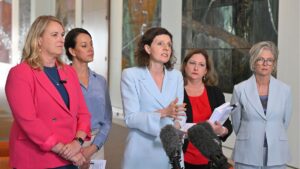Share
In June 2007 the Federal government put in place perhaps the most radical piece of rushed and poorly thought-through public policy ever seen in Australia, the so-called “Northern Territory Intervention” (NTI).
The provisions of the 1975 Racial Discrimination Act were suspended to restrict behaviours of Indigenous peoples in the territory, welfare payments were radically altered, employment programs were planned to be terminated, and the army and hundreds of other government personnel were relocated to enforce the new rules.
As is now well known, the NTI cost a very large sum of taxpayer’s money, at least around $1 billion in today’s terms. We also know that, as revealed in a number of university program evaluation reports over the years, with respect to its stated objectives, including assisting to reach more quickly some of the goals of “Closing the Gap”, the NTI failed spectacularly. What makes this of great interest to the Voice referendum is that the NTI program was designed to improve social outcomes without any consultation with, or advice from, members of Indigenous communities.
We ask the question: would there have been such a waste of scarce budget resources if there had been a Voice in place to inform the government that it was bound to fail and that there have to be more effective ways of going about improving Indigenous welfare? It is pretty obvious what the answer is to that question.
In the broad context of the referendum, there seem to us to be two reasons for having the Voice, which, to paraphrase, are basically:
- It is a matter of social justice (and good manners) to provide representatives of Indigenous peoples with an institutionalised (and permanent) body motivated by the importance of having a more informed advisory process; and
- Governments have tried many different processes in attempts to “close the gap”, and they just haven’t worked.
It is (2) that we are concerned with, and the example of NTI provides a powerful message about how not to go about policy reform. Consultation with informed people is intelligent public policy and, with the complexity of the issues related to Indigenous disadvantage, seems to be a necessary aspect to help ensure the success of government action.
In Australia, there is a formidable counter-example to the NTI, which illustrates the importance of consultation and advice-taking in the formulation of policy responses to a crisis. This happened in 1983 when Australia was confronted with the emergence of the HIV/AIDS pandemic. Dealing with the potential devastation of rapidly rising HIV cases and deaths from AIDS, the Federal health minister, Neal Blewett, adopted a bold strategy to contain and manage AIDS in Australia. The government determined that affected communities would be at the heart of policymaking about all aspects of the HIV/AIDS response, including care, treatment, research and prevention.
The health ministers of Australia were quickly persuaded that those closest to the many complex challenges of HIV/AIDS were best able to create and implement policies that would be most effective in controlling the spread of infection. Affected communities were not just “consulted”; they were accorded the duty of implementing policies agreed with governments, and they were funded to do whatever was needed. Over time, this built trust, shared responsibility and accountability between governments, clinicians, researchers and the most affected and at-risk communities, including First Nations. Governments gave authority, funding and influence to the people who knew what would work best to prevent the uncontrolled spread of HIV.
This policy response is a consummate example of the value of highly consultative processes with those most likely to be affected by the problem. In a very short period after the adoption of a suite of prevention policies, Australia’s rate of new HIV infections began to diverge from those in comparable countries. Tens of thousands of lives were saved, highlighting the authority of both listening to and acting on the advice of affected communities. And it was not only the saving of lives that mattered; hundreds of millions of taxpayer dollar outlays were averted in health expenditure alone.
Our broad point is that Voice-type policy processes have the capacity to avoid the ineffective use of hundreds of millions of dollars over many decades, which would likely otherwise be spent in misdirected attempts to redress Indigenous disadvantage. In other words, if the Voice is a more informed route to successful interventions aimed at closing the gap, then the entire population benefits through the better use of government expenditures: more “bang per buck” and/or additional public resources available for other pursuits (such as, for example, childcare subsidies, welfare outlays and, hospital and educational services), and/or lower taxes.
An important aspect of what we are arguing with respect to a “YES” vote is directly relevant to the likely many millions of voters who do not understand or do not identify with the case motivated by the social justice of constitutional recognition of Aboriginal and Torres Strait Islander peoples. It concerns instead the value to all of us of the more proficient, knowledgeable and thoughtful use of government resources. Put differently, policy in the Indigenous space can be improved, likely very substantially, if it means less “top-down” and insufficiently consultative and, therefore, uninformed approaches to what is essentially a national crisis. A properly functioning Voice effectively lowers taxpayer costs and thus benefits us all.
Bill Bowtell is an Adjunct Professor at UNSW. He was one of the architects of Australia’s response to HIV/AIDS. Bruce Chapman is an Emeritus Professor of Economics at the College of Business and Economics at the ANU. In the late 1980s he helped design the HECS policy. Bill and Bruce both worked in the Office of the Prime Minister Paul Keating in 1995/96.
Between the Lines Newsletter
The biggest stories and the best analysis from the team at the Australia Institute, delivered to your inbox every fortnight.
You might also like
Who votes with whom? Beware claims that use voting records to argue politicians have similar views
Sky News says community independent MP Allegra Spender supports more Coalition motions than Greens motions. But They Vote for You says Spender votes with Greens MPs more often than Coalition MPs. That both those claims are made about the same person is proof that voting comparisons are fraught. It is just as confusing when it
The rise of early voting in Australian elections
Are voters missing out on more than their democracy sausage?
The 2025 federal election is the first where a major party received fewer votes than independents and minor parties.
While the May election result was remarkable for the low vote share going to the major parties, it was just the most recent of a very long trend.



